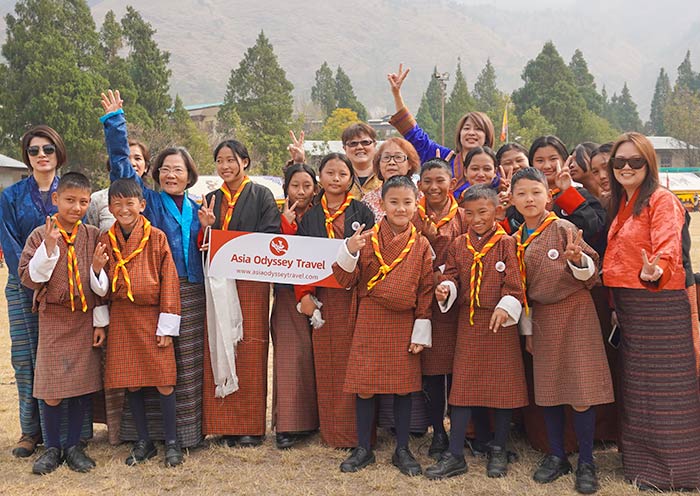Bhutan Weather &Temperature in February: Overview
February in Bhutan marks the tail end of winter and the beginning of spring. The weather during this time is generally cool with the possibility of occasional cold snaps, especially in the higher altitudes. The southern plains are more comfortable, with warmer temperatures compared to the rest of the country. Here’s what you can generally expect weather-wise in Bhutan in February:
| Towns and Cities | Average Temperature | Tourist Attractions | Average Temperature |
|---|---|---|---|
| Paro | -2°C to 10°C (28°F to 50°F) | Tiger's Nest | -2°C to 10°C (28°F to 50°F) |
| Thimphu | 0°C to 12°C (32°F to 54°F) | Dochula Pass | -6°C to 5°C (21°F to 41°F) |
| Punakha | 4°C to 16°C (39°F to 61°F) | Phobjikha Valley | -4°C to 9°C (25°F to 48°F) |
| Bumthang | -5°C to 5°C (23°F to 41°F) | Gangtey Monastery | -4°C to 9°C (25°F to 48°F) |
| Trongsa | -1°C to 8°C (30°F to 46°F) | Haa Valley | -6°C to 6°C (21°F to 43°F) |
| Wangdue Phodrang | 1°C to 14°C (34°F to 57°F) | Chele La Pass | -10°C to 5°C (14°F to 41°F) |
Punakha Weather in February
Temperature: Daytime temperatures in Punakha are relatively mild in February, with averages ranging from 8°C to 17°C. Nights can still be cool, sometimes dropping below 5°C.
Precipitation: Punakha sees less rainfall in February compared to the summer months, with occasional light showers.
Road Conditions: Roads are generally clear, but occasional cold snaps can lead to icy conditions, especially in the mornings or at higher altitudes.
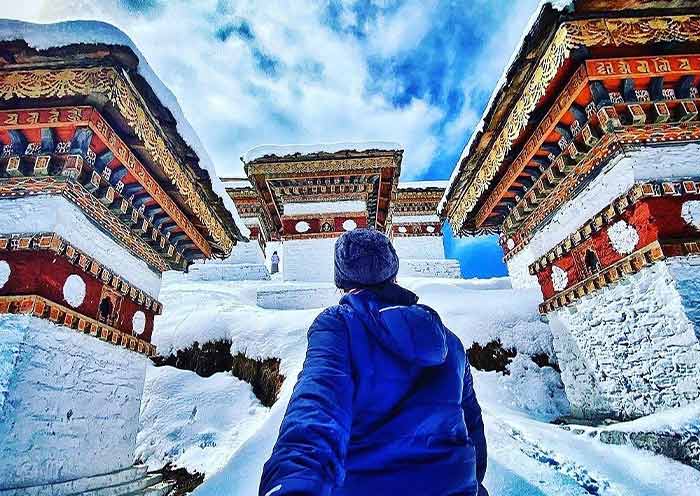

Thimphu Weather in February
Temperature: Thimphu experiences colder temperatures than Punakha, with daytime averages between 5°C to 15°C and night temperatures often dropping below zero.
Snow: While snowfall is not common in Thimphu in February, occasional flurries can occur, especially at higher altitudes around the city.
Road Conditions: The capital city's roads are well-maintained, but travelers should be cautious of potential frost and occasional snow on mountain passes.
Paro Weather in February
Temperature: Paro's weather is similar to Thimphu, with February temperatures ranging from 0°C to 10°C. Nighttime temperatures can be quite cold, sometimes reaching -5°C.
Snow: Snowfall is possible, particularly in the higher areas around Paro, which can see occasional snow showers.
Road Conditions: Snow and ice may temporarily affect mountainous areas, but main roads are usually kept open.
Bumthang Weather in February
Temperature: Bumthang is one of the coldest regions, with February temperatures from -5°C to 10°C. Nights are particularly cold and can drop to -10°C.
Snow: Bumthang has a higher likelihood of snow due to its elevation, which can affect travel plans and outdoor activities.
Road Conditions: Travelers should be prepared for snow-covered roads and potential travel delays in this region during February.
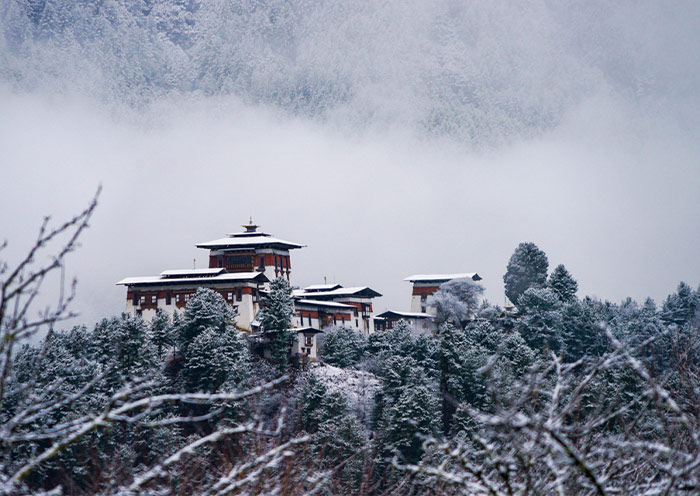
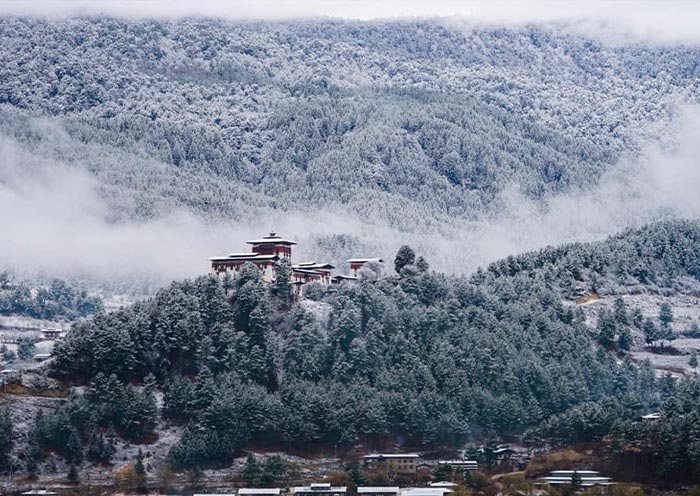
Places to Visit in Bhutan in February
Visiting Bhutan in February offers the unique advantage of experiencing the late winter landscape transitioning into spring. With fewer tourists, you can enjoy a more tranquil exploration of the country's natural beauty and cultural heritage. Here are the top places to visit in Bhutan during February, each offering something special for this time of year:
Punakha in February
Punakha Dzong: The striking architecture of this ancient dzong is even more enchanting against the backdrop of the clear, crisp winter skies. February also hosts the Punakha Tshechu, a vibrant festival with traditional mask dances.
Chimi Lhakhang: Visit the 'Temple of Fertility,' walking through the charming villages and mustard fields that may begin to bloom towards the end of the month.
Thimphu in February
Buddha Dordenma: This gigantic Buddha statue offers panoramic views of the valley, which can be exceptionally clear during the February weather.
National Memorial Chorten: Experience the calm atmosphere and observe the local residents in their daily worship.
Paro in February
Taktsang Monastery (Tiger’s Nest): The cooler weather makes the hike to this legendary monastery a pleasant endeavor. The clear winter air can also provide unparalleled views of this iconic site.
Rinpung Dzong: Explore this impressive fortress and monastery which holds a significant place in Bhutanese history.
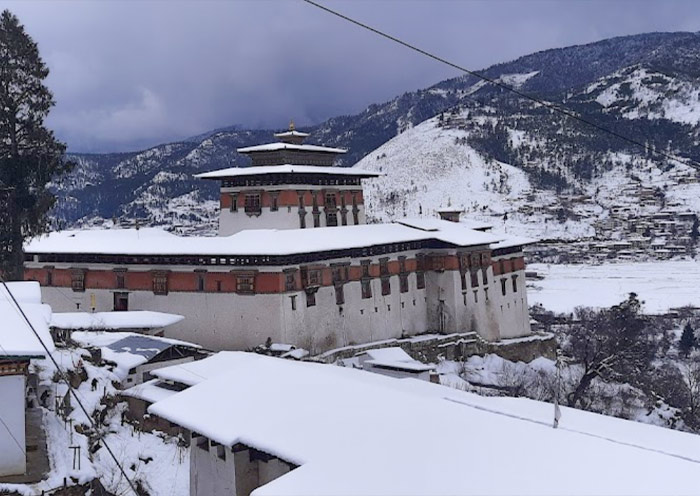
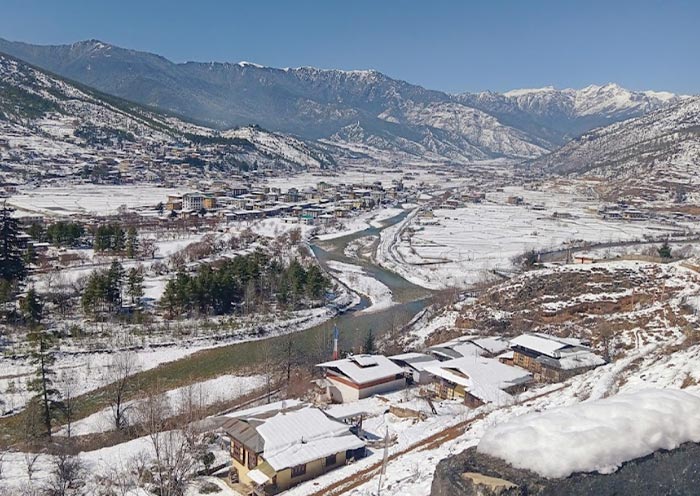
Phobjikha Valley in February
Gangtey Monastery: Standing atop a hill overlooking the valley, the monastery is a serene place to visit, with the last of the overwintering black-necked cranes possibly still in sight.
Nature Trails: Take advantage of the valley's nature trails, which can be particularly enjoyable as the winter chill begins to wane.
Bumthang in February
Jambay Lhakhang: This is one of the oldest temples in the country, and in February, you can enjoy its solemn beauty with fewer tourists around.
Kurje Lhakhang: The temple complex holds great significance and provides a peaceful environment to reflect and meditate.
Trongsa in February
Trongsa Dzong: Visit the ancestral home of Bhutan's royal family, enjoying the majestic view and the historical museum housed in the watchtower above the dzong.
Haa Valley in February
Haa Winter Festival: If your visit coincides with this festival, you'll be treated to a showcase of traditional living, Bhutanese cuisine, and local sports.
White and Black Temples (Lhakhang Karpo and Nagpo): Explore these centuries-old structures that provide insight into Bhutan's religious history.
February Travel Tips for Bhutan
Festivals: Time your visit to witness the local festivals, which are an integral part of Bhutanese culture.
Weather: Be prepared for cold weather, particularly in the mornings and evenings, and possibly snow in higher altitudes.
Bookings: While February is not peak tourist season, it's still wise to book your accommodations and transportation in advance, especially if you aim to be in Punakha for the festival.
Traveling to Bhutan in February allows you to witness the country’s culture without the crowds, and with the potential for clear skies, you'll have a good chance of enjoying magical Himalayan views.

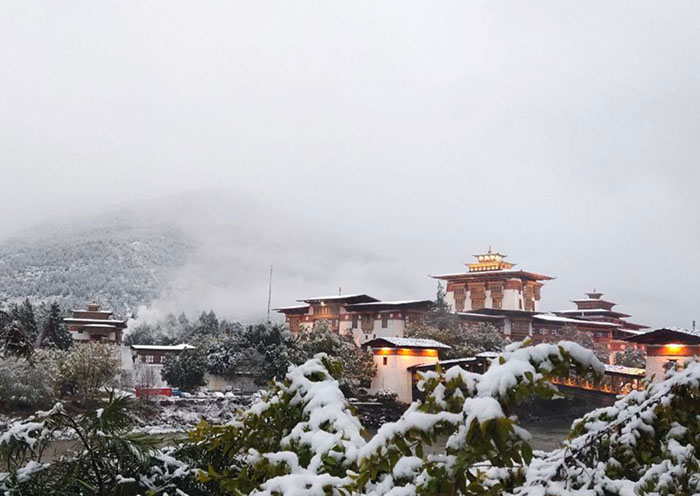
What to Wear in Bhutan in February & Packing Tips
February in Bhutan can still be quite cold, especially in the mornings and evenings, and the weather can vary significantly depending on the altitude and region you are visiting. Here are some guidelines on what to wear and packing tips for your trip to Bhutan in February:
Clothing
- Base Layers: Start with thermal base layers that can retain body heat while allowing moisture to escape.
- Insulating Layers: Add a fleece or wool sweater that can be easily put on or taken off as temperatures change throughout the day.
- Outer Layer: A windproof and waterproof jacket is essential. It should be sturdy enough to protect against wind and any unexpected rain or snow showers.
- Bottoms: Warm trousers or jeans are good for daytime wear. Insulated trekking pants are excellent if you're hiking.
- Footwear: Waterproof, insulated hiking boots are a must if you plan on trekking. For city and town walks, warm, comfortable shoes with good grip are suitable.
- Socks: Wool or thermal socks will keep your feet warm. Consider packing an extra pair in case they get wet.
Accessories
- Hat: A warm hat that covers your ears is essential to prevent heat loss.
- Gloves: Waterproof and insulated gloves are recommended, especially if you're trekking.
- Scarf: A scarf or neck gaiter can protect you from the wind.
- Sunglasses: High-quality UV-protection sunglasses are crucial to protect your eyes from the intense sun, particularly at higher elevations.
Other Essentials
- Sunscreen: The sun can be surprisingly strong, even in February.
- Lip Balm: With SPF protection to prevent chapped lips.
- Daypack: A comfortable daypack for carrying essentials during day trips.
- Moisturizer: The cold, dry air can be harsh on your skin.
Packing Tips
- Layering: Layering your clothing is key. It allows you to adapt to the varying temperatures throughout the day and at different altitudes.
- Modesty: Bhutanese culture is conservative, so pack clothes that cover legs and shoulders, especially when visiting religious sites.
- Versatility: Choose clothes that can be mixed and matched, saving space and weight in your luggage.
- Cultural Respect: Include attire suitable for visiting dzongs, monasteries, and temples. This means no hats inside, and your arms and legs should be covered.
- Medication: Bring any personal medication as well as basic travel health kits.
- Space: Leave a little space in your luggage for souvenirs and gifts you may want to bring home.
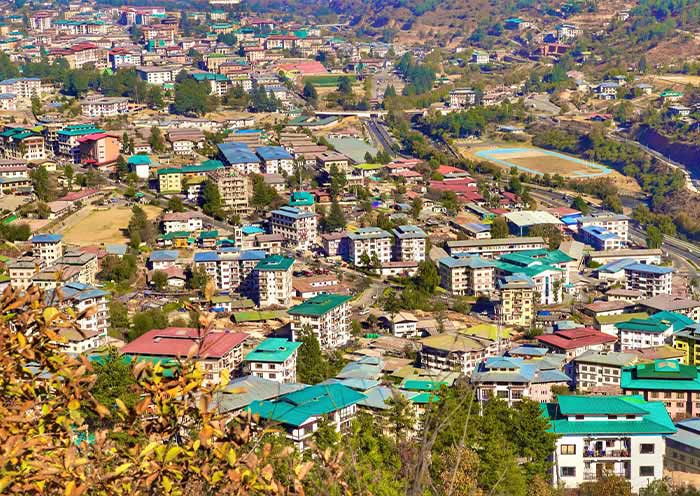
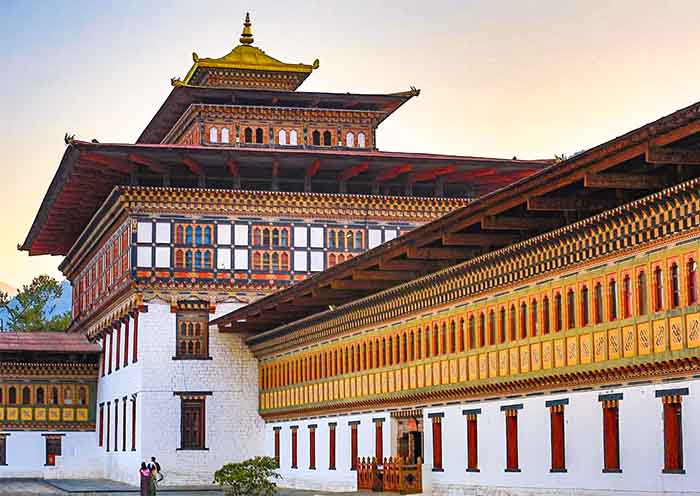
How to Plan a Bhutan Tour in February
If you're planning a trip to Bhutan in February, be sure not to miss the Punakha festival and the Tiger's Nest Monastery. A 6-day itinerary can make for a truly enriching Bhutanese journey in February.
Day 1: Arrival in Paro - Land in Paro and take the day to settle in and acclimatize to the altitude of Bhutan.
Day 2: Thimphu Sightseeing - Drive to Thimphu for a day of cultural sightseeing, visiting key landmarks such as the National Memorial Chorten and Buddha Dordenma.
Day 3: Punakha Exploration - Head to Punakha to explore historical sites, including the stunning Punakha Dzong and the longest suspension bridge in Bhutan.
Day 4: Archery in Paro - Return to Paro and experience Bhutan's national sport of archery in the afternoon.
Day 5: Trek to Tiger's Nest - Embark on the iconic hike to Paro Taktsang, the Tiger's Nest Monastery, a highlight of Bhutanese spiritual life.
Day 6: Departure - Conclude your Bhutan Tours with a departure from Paro International Airport.


Explore Bhutan with Local-based Asia Odyssey Travel
Asia Odyssey Travel is a local-based travel agency that offers Bhutan Group Tours and customized tours in Bhutan. Our team of experienced local guides ensures that you have an immersive and insightful journey, sharing our deep understanding of Bhutanese culture, history, and spirituality.
Bhutan, known as the "Land of the Thunder Dragon," is a captivating destination with its stunning landscapes, ancient monasteries, and rich Buddhist traditions. Asia Odyssey Travel can help you discover the highlights of Bhutan, including Paro, Punakha, Thimphu, Bumthang, and Gangtey.
Whether you're interested in trekking through pristine mountain trails, participating in vibrant festivals, or exploring remote villages, Asia Odyssey Travel can tailor Bhutan Trekking Tour and Bhutan Festival Tour itineraries to suit your preferences.
Embark on a memorable journey through Bhutan with Asia Odyssey Travel and immerse yourself in the enchanting beauty and traditions of this unique Himalayan kingdom.
If you have any questions about this article, please contact us by submitting the following form and we'll immediately get back to you.











